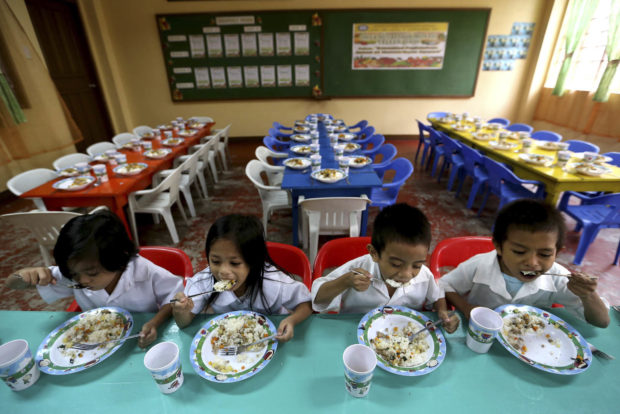
FORTIFIED FOOD-SCHOOLCHILDRENGrade 1 students from the Mandaluyong Elementary School eat meals fortified with malunggay and iodized salt during the school’s daily feeding program intended for those who are found to be severely malnourished or wasted. Feeding Coordinator Ryan Simbajon says that all the meals served to the children include malunggay leaves to address micronutrient deficiencies for proper growth, particularly for pupils from kinder level to Grade 3. INQUIRER FILE PHOTO / LYN RILLON
MANILA, Philippines — The feeding program for students will still continue even under a new learning system as the country continues to grapple with the coronavirus pandemic, the Department of Education (DepEd) said Wednesday.
During the hearing of the Senate committee on basic education, arts, and culture, DepEd Undersecretary Nepomuceno Malaluan said there will be changes with regard to the implementation of their school-based feeding program especially now that learning is now home-based.
Nepomuceno said the feeding program will cover all incoming kindergarten students as well as Grades 1 to 6 students who were deemed to be under “wasted” and “severely wasted” categories based on last year’s health records.
“With respect to target beneficiaries, it will be difficult now to have the nutritional assessment which is often face to face at the opening of the classes where the children are weighed and their nutritional standards are assessed,” Nepomuceno said.
In terms of type of feeding, Nepomuceno said it will be changed from provision of usual hot meals in the school to a ration of nutritious food products, which will either be delivered to households or picked up by parents in schools.
“I believe this is picked up also on a weekly basis, either picked up by the parents in school or delivered to the household similar to the learning resources. We have partnership at various levels whether with local governments or with a private partners,” Nepomuceno said.
The number of feeding days will likewise be adjusted based on the remaining number of school days, said Nepomuceno.
He said that due to the changes in the school calendar and in consideration of the possible lapse of funds by the year-end, the feeding period for this school year is reduced to 60 days for the regular component, which includes the nutritious food products, and 50 days for the milk component.
“Before, when we were starting the school year at the first Monday of June, we can still do 120 days feeding for the months prior to December but this time, because we started late, we are constrained to provide it for the remainder of the school yer before the break in December,” the DepEd official said.
While DepEd is open to the idea of still providing hot meals, Nepomuceno said safety covers will still have to be considered.
“Because in contrast to dry foods that can be done on a weekly basis, this will have to be done on a daily basis if it were hot meals so this will involve more physical contact. We are still assessing it but we are considering it and will be subject to later supplemental guidelines in case it will be allowed,” Nepomuceno said.
Classes for school year 2020-2021 will begin in October after it was moved from its initial schedule of August 24.

